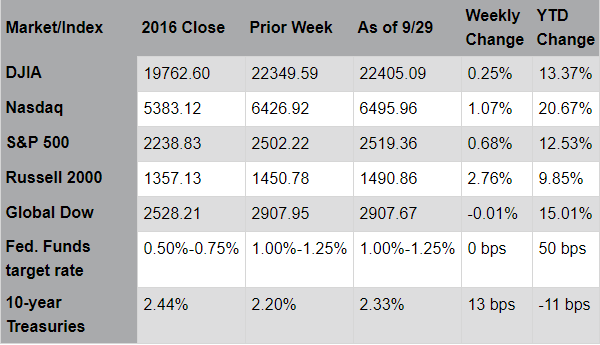North Korea. Charlottesville. Harvey. Irma. Maria. Despite all of the Trials and Tribulation of the last quarter - alternatively scary and sad, the three months just passed was yet another example of just how comfortable investors have become with being uncomfortable. The S&P was up +4% in the quarter, notching its 8th quarterly advance. The index’s average daily change during the period was a mere 0.3%, its lowest since 1968. Perhaps it’s a coincidence, but it appears that both bond yields and the sectors and stocks that would benefit most from the President’s economic agenda bottomed within a day of the White House cutting a deal with the Democrats on Dreamers and the debt ceiling. Those fights are likely to occur at some point in the future, but in the last four weeks it seems as if investors are betting on the idea that the President, unbound by party loyalty, will fashion some sort of coalition to achieve tax relief. Small-Caps, Banks, Industrials, and the Dollar have all surged.
Source: Pacific Global Investment Management Company

Chart reflects price changes, not total return. Because it does not include dividends or splits, it should not be used to benchmark performance of specific investments.
Market Week
Last week, the rotation from large cap stocks towards small caps continued as President Trump revealed the framework for tax reform; also, crude oil prices, having recently gained more than 20%, entered bull market territory. In September, The Russell 2000® Index of small companies gained 2.8% to outpace the large cap-dominated S&P 500® Index (+0.7%). For the month, small caps (+6.2%) outperformed large caps (+1.9%). Notably, the popular FAANG stocks stalled in September as only Netflix (+3.8%) and Alphabet Class A (formerly known as Google, +1.9%) rose. Higher crude oil prices triggered a rally in Energy stocks. The top performing sector rose 1.9% for the week and 8.8% for the month; the PHLX Oil Service Sector Index, which includes many small and mid-cap energy services companies, rose 17.9% in September. West Texas Intermediate crude, the North American benchmark, rose to $51.64, a 21.4% improvement from its June lows. On Wednesday, President Trump revealed the highly anticipated framework for tax reform. Notable elements of the proposed Republican plan include lowering the corporate tax rate to 20%; replacing the personal exemption with a larger standard deduction; reducing the number of tax brackets from seven to three; and eliminating most itemized deductions. Many details, negotiations, and adjustments (including a possible fourth bracket for high income earners), remain. Domestically-oriented companies, including retailers, rallied on the announcement. Meanwhile, global economic data remains positive: the final estimate of second quarter U.S. GDP increased growth by 0.1% to 3.1%; China’s industrial profits surged 24% in July; Japan’s August results included increases in both industrial production (+2.1%) and retail sales rose (+1.7%); and, German unemployment hit a record low of 5.6% in September.
Stocks performed impressively in September despite the Hurricanes Harvey and Irma, heightened geopolitical tensions with North Korea, and few corporate announcements. Investors were apparently encouraged by improving global economic conditions, the ongoing recovery in energy, and potential for tax reform. Attention now turns to third quarter earnings season. Analysts expect companies in the S&P 500® Index to report sales growth of 4.8% and earnings growth of 4.1%. Both of these are below last quarter’s growth rates of 5.4% and 10.4%, respectively. The reductions are largely due to the hurricanes which paralyzed large parts of Texas and Florida, delayed shipments of goods into and out of the affected areas, displaced millions of homeowners, and disrupted businesses throughout the region. Investors largely anticipate these impacts and will instead look for details regarding rebuilding and replacement opportunities; these activities could provide a meaningful benefit to sales and earnings over the next several quarters. Also, with oil prices stabilizing above $50 per barrel, investors will look for indications that energy projects are moving forward. The recent rally in energy stocks points to confidence that a recovery is indeed underway. The market’s strong performance in September, especially for small cap stocks, provides positive momentum heading into the reporting period; strong earnings results could sustain the rally through October.
Source: Strategas, Pacific Global Investment Management Company
Last Week's Headlines
- The value of the goods and services produced by the economy is measured by gross domestic product. In the second quarter, the GDP increased at a rate of 3.1% compared to an increase of 1.2% in the first quarter. The rise in the rate of economic growth in the second quarter is attributable to increasing personal consumption expenditures, business investment, exports, federal government spending, and private inventory investment. A measure of the income earned during the production of goods and services, the gross domestic income index increased 2.9% in the second quarter after climbing 2.7% in the first quarter. This report may be providing evidence that the economy is slowly but steadily gaining momentum heading into the third quarter.
- August saw personal income (pre-tax), disposable personal income (after-tax), and consumer expenditures increase over July. Personal income increased $28.6 billion, or 0.2% disposable personal income gained $14.9 billion, or 0.1% and personal consumption expenditures increased $18.0 billion, or 0.1%. While each of these indicators increased, the gains are considered marginal at best and highlight what has been a weak stretch of upward inflation. Core personal consumption expenditures (excluding food and energy) is one of the inflation gauges relied upon by the Federal Reserve. Further evidencing weakness in price increases, the core PCE increased a scant 0.1% for the month and is up only 1.3% over the last 12 months.
- Sales of single-family homes dropped 3.4% in August from July. The August sales rate is 1.2% below the August 2016 rate. New home sales prices fell in August. The median sales price of new houses sold in August 2017 was $300,200 ($319,900 in July). The average sales price was $368,100 ($371,300 in July). The estimate of new houses for sale at the end of August was 284,000. This represents a supply of 6.1 months at the current sales rate.
- Manufacturers of durable goods saw a rebound in new orders and shipments in August following a slow July. New orders for durable goods increased $3.9 billion, or 1.7%, in August. Transportation equipment, up 2 of the last 3 months, led the increase, up $3.6 billion, or 4.9%. Shipments of machinery, which climbed 1.1% for the month, led a 0.3% increase in total shipments. Inventories of manufactured durable goods in August, up 13 of the last 14 months, increased $1.4 billion, or 0.3%. Again, machinery, up 9 of the last 10 months, led the increase, gaining 0.8%.
- The international trade gap for goods narrowed in August. The international trade deficit was $62.9 billion in August, down $0.9 billion from $63.9 billion in July. Exports of goods for August were $128.9 billion, $0.3 billion more than July exports. Imports of goods for August were $191.8 billion, $0.6 billion less than July imports.
- The Conference Board Consumer Confidence Index® and the University of Michigan's Index of Consumer Sentiment each showed consumer confidence fell in September from August. The hurricanes, North Korea, Charlottesville, and the country's growing divisiveness have affected consumers' economic outlook.
- In the week ended September 23, the advance figure for initial claims for unemployment insurance was 272,000, an increase of 12,000 from the previous week's level, which was revised up 1,000. Hurricanes Harvey and Irma impacted initial claims. The advance insured unemployment rate remained at 1.4%. The advance number of those receiving unemployment insurance during the week ended September 16 was 1,934,000, a decrease of 45,000 from the previous week's revised level.
Eye on the Week Ahead
The August report on international trade in goods and services is out this week. The trade deficit for July was about $44 billion. The week ends with employment figures for September. The labor market has been steady for much of the year, although wage increases have been minimal. Average hourly earnings for August increased only 0.1% and were up 2.5% year-over-year. The September report is not expected to significantly deviate from those figures.
